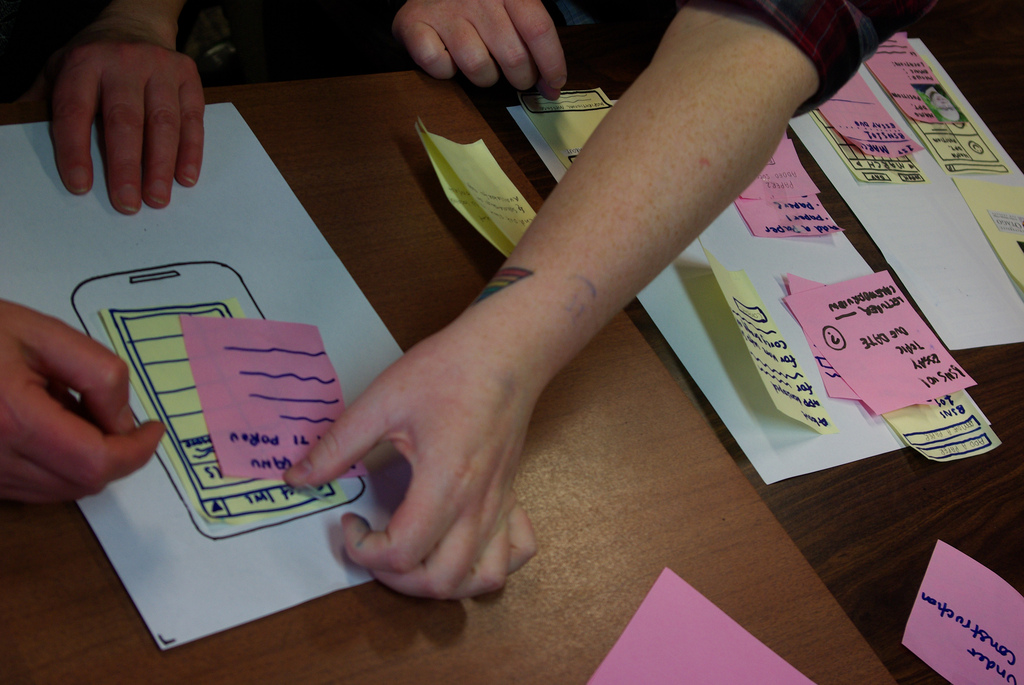
Grantmaking gone lean – meet 8 new Knight-funded prototypes
Photo credit: Flickr user Samuel Mann
In a 2011 essay, MIT’s Joichi Ito championed the idea that the architecture of the Internet and free software have slashed the cost of innovation so much, that it’s cheaper to try something than to “sit around and try to figure out whether to try something.” In this spirit, last summer we launched the Knight Prototype Fund, which helps journalists, technologists and tinkerers take that first step, bringing media innovation projects from idea to demo. This is our attempt at grantmaking gone lean. Following a mantra of fail fast, fail forward, the fund offers small teams six months and up to $50,000 in funding to build and test core assumptions needed to prove – – the viability of a tool, technology or approach. We want to test more ideas, find out what works and help scale projects that show promise.
As part of the initiative, we encourage teams to embrace human-centered design, rapid & lo-fi prototyping and iterative development models to quickly pivot and connect solutions to uncovered needs. We want to learn and improve – before moving to the bigger, more expensive steps of building out a full project. And as we learn, we want to share with others working on similar problems.
So what are we experimenting with? Today, we are excited to announce eight new projects receiving grants from the Prototype Fund:
- Associated Press: Seeking to make newsrooms more efficient by creating a tool that enables journalists to easily combine data for their stories with geographically related data sets, a task that currently represents a significant technical hurdle for many reporters on deadline.
- Data Toys: Building physical and digital models of complexity in the news that encourage open-ended play. Their first projects are in partnership with Public Radio International and Radiolab and are being built through a class at Parsons The New School for Design.
- eCitizens: Building an online service giving citizens the ability to subscribe to receive an alert when their local government is working on issues they care about most. The project, to be piloted in San Diego, will use data from Granicus, a major software company for city documents as well as manually scraping municipal websites;
- Hollaback: Piloting a mobile app that allows people to report street harassment directly to their cities. It is being developed in partnership with the New York City Council.
- LAMP: Building an online video editor that allows students to remix and respond to copyrighted materials as part of a media literacy class. The project will be piloted in New York City schools.
- North Central Texas Council of Governments: Creating a new community crime watch portal updated with data from local law enforcement agencies. The site will offer mapping to see where crime is happening and alerts to be sent to crime watch groups. The council will be partnering with the Dallas Morning News.
- OpenGenderTracking Project by Bocoup: Raising awareness of gender balance in the media by creating a deployable service newsrooms and other content providers can use to evaluate the gender split of both writers and voices in stories. Funding will help build the service as well as conduct two case studies with The Boston Globe and Global Voices.
- Rashomon Project: Offering journalists an improved tool to review user-submitted content by allowing users to easily assemble video of breaking news chronologically, so that the same event can be viewed by various angles. The project is organized by the University of California Berkeley’s CITRIS Data and Democracy Initiative.
The Prototype Fund has a simple, rolling application with no deadlines. PS – The Knight News Challenge on Open Gov is accepting submissions until March 18. Some of the projects mentioned in this post originally came to us via last year’s News Challenge. We make an active effort to funnel interesting projects to the right program at Knight Foundation, no matter how they come to us. By Chris Barr, media innovation associate at Knight Foundation
Related: “8 Experimental Tools To Change Media For The Better” in Fast Company, “Knight funds tools to fight street harassment, gender imbalance, and data without context” in Nieman Lab and “Data and UGC tools among projects to receive prototype funding” in Journalism.co.uk
Recent Content
-
Journalismarticle ·
-
Journalismarticle ·
-
Journalismarticle ·


